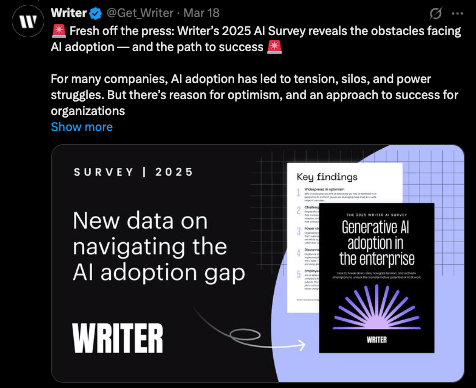Hello AI Enthusiast,
This week brings us an interesting mix of progress and challenges in the AI world. Google continues to enhance its Gemini offerings with features that quietly impress (especially image generation), while Italy's Il Foglio claims to be the first newspaper to publish an entirely AI-generated edition. Meanwhile, a new survey reveals the growing disconnect between how executives and employees view AI implementation in their companies. Let's explore these developments and what they mean for the future of AI adoption.
The Big Picture 🔊
Google Expands AI Capabilities
Google has expanded Gemini 2.0 Flash native image generation to developers. The technology excels at conversational image editing and accurately rendering text in images. Meanwhile, Gemini received significant upgrades: a 1M token context window for Advanced users, widely available Deep Research, integration with more Google apps (Calendar, Notes, Tasks, soon Photos), and free Gems for all users. Additionally, Gemini now features Canvas for real-time collaboration on documents and code, and Audio Overview, which transforms documents into engaging, podcast-style AI discussions for easier learning on the go.
Il Foglio Publishes World's First AI-Generated Newspaper Edition
Italy's conservative daily Il Foglio has released what it claims is the world's first entirely AI-generated newspaper edition. The four-page "Il Foglio AI" supplement features AI-written articles, headlines, quotes, and summaries, with journalists only "asking questions and reading answers." Content included stories about Trump, Putin, the Italian economy, and relationship trends among young Europeans. The articles lacked direct human quotes.
AI Creating Deep Divide Between Executives and Workers
2025 Writer survey reveals a stark disconnect in AI adoption perceptions. While 89% of executives claim their company has an AI strategy, only 57% of employees agree. Half of executives believe AI is "tearing their company apart," with 59% seeking jobs elsewhere. Worker resistance stems from replacement fears and poor tools - 41% of younger employees admit to sabotaging AI initiatives, and 35% pay out-of-pocket for better AI tools.
Is your company facing this AI divide? Our training programs bridge the gap by helping teams understand not just how to use AI tools, but why they matter. Whether you use Copilot, Gemini, Claude, or ChatGPT, our trainings align leadership vision with practical implementation. Don't waste your AI investment, learn how we can help your organization embrace AI effectively.
Bits and Bobs 🗞️
Google announced the development of "open" AI models for drug discovery called TxGemma, aiming to streamline the drug development process.
Elon Musk’s AI company, xAI, has acquired the startup Hotshot, which specializes in AI-powered video generation models, possibly indicating xAI’s intention to develop its own video creation tools.
Mistral Small 3.1 is the first open-source AI model to surpass proprietary small models in handling text, multimodal inputs, and multiple languages efficiently, and it is available for download under an Apache 2.0 license.
Mirage by Captions is the world's first AI model designed to generate complete videos from just a prompt, creating original actors and content without licensing restrictions, and simplifying video ad production for marketers.
Amazon Web Services (AWS) has offered one of its long-term cloud customers access to advanced chips intended to deliver enhanced computing power for AI applications.
Nvidia CEO announced the Blackwell Ultra chip family, expected in the second half of 2025, designed to improve AI inference and reasoning capabilities.
OpenAI’s o1 and o3-mini models now support Python-powered data analysis in ChatGPT, handling tasks such as performing regression analysis on test data, creating visual representations of complex business metrics, and running scenario-based simulations.
That's a wrap on our newsletter! Before you go, here’s a quick recap of our offerings:
AI Academy Membership: Get 12 months of access to all our cohort-based programs, live webinars, on-demand courses, and tutorials.
Generative AI Project Bootcamp: Accelerate processes and solve business problems by mastering prompts and building AI prototypes, without coding.
Practical Introduction to ChatGPT: A free course on using ChatGPT confidently, understanding its workings, and exploring its potential.
Customized Corporate Training: Equip your team with the skills they need to unlock the potential of AI in your business.
Catch you next week! 👋






